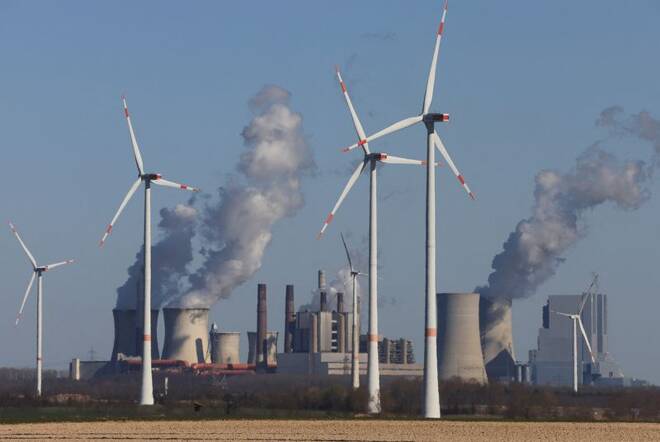Advertisement
Advertisement
Explainer-How margin calls came to threaten Europe’s energy firms
By:
By Vera Eckert and Nora Buli FRANKFURT (Reuters) - Soaring power and gas prices have rocked energy companies across Europe, forcing utilities and traders to secure extra funds from governments and banks to cover margin call requirements.
By Vera Eckert and Nora Buli
FRANKFURT (Reuters) – Soaring power and gas prices have rocked energy companies across Europe, forcing utilities and traders to secure extra funds from governments and banks to cover margin call requirements.
Below is an outline of how they got to this point:
Emerging risk?
Europe has thousands of energy firms operating in a liberalised power and gas market intended to provide guaranteed competitive prices.
Signs of market strain started appearing quickly in 2022 with an unprecedented jump in European gas and power prices due to a confluence of factors, including high post-pandemic energy demand, cuts to Russian gas supply in the wake of the war in Ukraine and unusually low nuclear and hydropower generation.
To manage risk, several producers sell some of their power up to three years in advance on exchanges, but this also requires making security deposits to guarantee future deliveries in case of default.
These deposits – known as margin calls – have risen sharply in line with prices, leaving several companies badly exposed to bankruptcy as they are unable to find cash fast enough.
To avoid insolvencies, governments and regulators are now stepping in to help provide access to fresh money.
Why do volatile prices cost money?
Wholesale and exchange-based commodity markets such as gas, power, coal and oil require down-payments from utilities to cover open liabilities, which rise when there are unusually wide price fluctuations.
Selling future output ahead necessitates paying buyers a safety deposit or margin in case the producer cannot deliver. Once the supply is received, the producer gets their money back.
Germany’s benchmark power contract for 2023 surged to a record high of 1,050 euros ($1,064.81) a megawatt hour (MWh) in late August, 14 times the level a year ago. Benchmark European gas prices have surged up to 340% in a year.
What is the damage?
Norwegian energy group Equinor estimated that European companies need at least 1.5 trillion euros to cover the cost of their exposure to soaring gas and power prices, and that does not include Britain.
WHO HURTS, WHO DOESN’T?
Europe’s energy crisis has taken the biggest toll on companies needing fossil fuel raw materials and has been easier to navigate for those with more renewables in their portfolio.
Generally, those with deeper financial reserves are better protected than medium and smaller power generation operators or companies with large trading activities.
However, big players with large forward sales positions are feeling the strain, among them Finland’s Fortum and Swiss power company Axpo, both of which are now getting financial guarantees from their governments.
Britain’s largest energy supplier Centrica is reportedly seeking fresh money from banks, while Danish energy trader Danske Commodities has secured extra funds from parent company Equinor.
Meanwhile, Germany’s biggest generator RWE has three syndicated loans totalling 8 billion euros to secure forward transactions and has a mixed portfolio that lessens exposure to costly gas.
Caught in between?
In addition to margin calls from exchanges, the biggest importers and resellers of gas are struggling with the loss of cheap supply they expected from Russia and the need to buy replacement volumes on the spot market at elevated prices.
For example, Uniper – Germany’s biggest importer of Russian gas – burned through its cash reserves sourcing gas on the expensive spot market after Moscow slashed flows to Germany, prompting a 15-billion-euro bail-out from Berlin agreed in July.
But that rescue package, which has grown to 19 billion euros, is no longer enough and Uniper says the government might have to take a controlling stake.
Uniper relied on long-term supply contracts with Gazprom which are now in doubt, a challenge now also hitting SEFE – formerly known as Gazprom Germania – and EnBW subsidiary VNG.
By contrast, rival RWE said it was considering bearing its own losses and not reverting to Germany provisions to help operators via a gas levy charged to all consumers from Oct. 1.
More help on the way?
The European Securities and Markets Authority (ESMA), the EU’s markets watchdog which regulates clearing houses that set margin levels, said it was actively considering what it could do to help with collateral, as well as looking at so-called circuit breakers or temporary halts on trading energy contracts if prices see huge moves.
The European Commission asked ESMA to present options for broadening the list of eligible collateral beyond cash, and the conditions under which bank guarantees could be accepted, by Sept. 22.
Margin is posted in the form of cash, but some industry officials would like to use non-cash alternatives such as letters of credit or guarantees from their banks, a common form of collateral in the U.S. physical oil market but one that is hard to use in Europe due to strict margining rules.
($1 = 0.9861 euros)
($1 = 0.9590 Swiss francs)
(Reporting by Vera Eckert and Nora Buli, additional reporting by Huw Jones, editing by Veronica Brown and Emelia Sithole-Matarise)
About the Author
Reuterscontributor
Reuters, the news and media division of Thomson Reuters, is the world’s largest international multimedia news provider reaching more than one billion people every day. Reuters provides trusted business, financial, national, and international news to professionals via Thomson Reuters desktops, the world's media organizations, and directly to consumers at Reuters.com and via Reuters TV. Learn more about Thomson Reuters products:
Did you find this article useful?
Latest news and analysis
Advertisement
